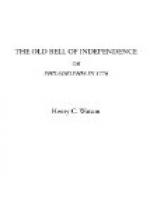“On the day of the festival, the whole army was paraded on the hills on both side of the river, and it was a grand view. For several miles around, as far as the eye could reach, lines of men, glittering in their accoutrements, appeared. The officers were in front, or among their respective commands, and their waving plumes seemed like floating foam on the waves. At the signal—the firing of three cannon—all the regimental officers left their commands and proceeded to the building to join in the festivities there prepared by order of the commander-in-chief.
“At five o’clock, dinner being on the table, an interesting procession moved from the quarters of Major-General M’Dougall, through a line formed by Colonel Grain’s regiment of artillery. In front, walked the noble commander-in-chief, his countenance expressive of unusual cheerfulness, and his stately form moving with characteristic grace and dignity. He was accompanied by his lady, and his suite followed him. Then came all the principal officers of the army with their ladies, Governor Clinton and lady, and various distinguished characters from the States of New York and New Jersey. The procession moved to the vast bower, where more than five hundred guests were assembled. The banquet was magnificently prepared, and bands of music added melody to the other charms of the scene—thus feasting and satisfying the eye, the ear, and the palate. The cloth being removed, thirteen appropriate toasts were drank, each being announced by the firing of thirteen cannon and the playing of appropriate music by the bands in attendance. The company retired from the table at seven o’clock, and the regimental officers rejoined their respective commands. In the evening, the arbor was brilliantly illuminated. The numerous lights, gleaming among the boughs and leaves of the trees that composed the roof and the walls, presented the appearance of myriads of glowworms or of thousands of stars glittering in the night. When the officers had rejoined their different regiments, thirteen cannon were again fired, as a prelude to the general feu-de-joie which immediately succeeded. Three times was it repeated, and the reverberations sounded among the hills with tremendous effect, darkness adding grandeur to the scene, as the flashing of the musketry of the army broke upon it like sheeted lightning. The feu-de-joie was immediately followed by three shouts of acclamation and benediction for the dauphin, given by the whole army as with one voice. At half-past eleven o’clock the celebration was concluded by an exhibition of fireworks, ingeniously constructed of various figures. There was a ball given during the evening in the arbor, at which General Washington, with Mrs. Knox for a partner, led the dance. Thus ended the general festivity.”
“There,” remarked Mrs. Harmar, “that has interested me much more than all the horrible stories that have been told to-day. How I should have liked to be there!”




